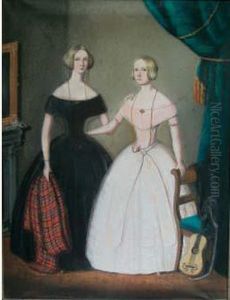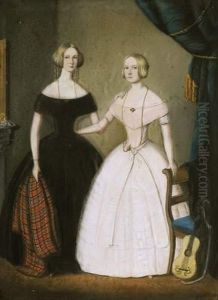Wilhelm Heinrich Langschmidt Paintings
Wilhelm Heinrich Langschmidt, also known as WH Langschmidt, was a German-born artist and naturalist who became a prominent figure in South African art history during the 19th century. Born in 1805 in Schleswig-Holstein, which was then part of Denmark, he developed an interest in the natural world and drawing at an early age. His talent in art was evident, but little is known about his early training before he emigrated to South Africa.
Langschmidt arrived in Cape Town in 1834 and soon became an integral part of the Cape's cultural and scientific community. He engaged in various activities, including teaching drawing and painting, while also continuing his work as a naturalist. His artistic output was diverse, encompassing a range of subjects from landscapes and portraits to depictions of the indigenous flora and fauna of the Cape.
In 1838, Langschmidt undertook a significant project that would solidify his reputation: he began work on a series of lithographs depicting the Khoikhoi people, who were indigenous to the Western Cape region. These images are particularly valuable as they are some of the few contemporary visual records of the Khoikhoi at the time, offering insight into their appearance, dress, and customs.
Despite his contributions to the art and science of his adopted country, Langschmidt faced personal difficulties and struggled financially throughout his life. He often relied on the patronage of local officials and the support of the scientific community to continue his work. His circumstances did not improve significantly, and he passed away in Cape Town in 1866.
Langschmidt's legacy lives on through his artwork and lithographs, which remain important historical documents as well as artistic achievements. They provide a rich visual record of South African society and the natural environment during a period of significant change. Today, his works are considered valuable cultural artifacts and are held in various collections, including the South African Library and the Iziko South African National Gallery in Cape Town.

